

Curious about sales KPIs?
Sales KPIs are the easiest way to track your sales performance to ensure that your company’s sales strategy is working.
But what are sales KPIs and how can they help you?
And the most important question… which ones should you be tracking?
In this article, we’ll go over everything you need to know about sales KPIs and take a look at the ten best KPIs you can track today. We’ll also cover the easiest way to track KPIs for sales.
Let’s go!
What Are Key Performance Indicators (KPIs)?
KPI stands for Key Performance Indicator.
KPIs help businesses and teams visualize their progress towards their goals.
For example, a realistic performance indicator could be the number of customers you’ve gained vs the ones you’ve lost. This information gives you insight into whether or not you’re giving your customers what they want.
Check out these KPI examples to learn more about KPIs.
What Are KPIs In Sales?
KPIs for sales are leading indicators that help a sales leader, sales manager, and sales team determine how well they’re progressing towards their sales goals and organizational goals.
A successful sales organization has access to the right sales data.
With KPIs, your sales department can:
- Track their progress over achieving targets
- Optimize their sales funnel
- Improve revenue streams
The Top 10 Sales KPIs To Track In 2021
To help you find the right KPIs for your organization, here are the ten best KPIs for sales. To make this more comprehensive, we’ve organized the KPIs into four different categories:
Let’s take an in-depth look at all these sales KPIs:
A. Team performance
Team performance KPIs track how efficient your sales team is and how every individual team member contributes to your overall sales plan:
1. Sales target
This KPI measures your company’s current sales revenue/output and compares it to the target you decided on at the start of the year/quarter.
The target can be set as either a monetary value, sales volume, or the number of new accounts. It’s important to monitor your sales performance against targets because it creates a data-driven work culture.
But you can’t have a data-driven culture without data-driven employees, now can you?
That’s why you need to make those sales targets visible to your entire team.
By training your team members to interpret charts and other sales data, they’ll eventually be able to gauge how well they’re doing.
2. Sales per rep
This KPI measures how many sales were made per sales rep. This helps teams set personal goals that align with organizational objectives.
However, it’s important not to create a hyper-competitive work culture.
Why?
Your sales reps are part of a team, and you don’t want them to react like this…
3. Sales cycle length
This KPI evaluates the average length of your team’s sales cycle.
A sales cycle process is a series of steps that a salesperson goes through to close a lead.
The sales cycle length is the time between the first conversation with a customer to the moment you close the deal.
If your company makes B2B sales, your sales cycle will likely be way longer than B2C companies.
However, that doesn’t mean a shorter sales cycle length is always better.
You’ll also have to measure the churn rates long after the deal is closed.
Wait, why?
Let’s say you have a sales rep who’s closing deals at a supersonic speed (short sales cycle length), but data shows that those customers churn (stop doing business) after a few months.
On the other hand, you might have a representative that takes time to close deals, but the customers continue to be loyal months after the sale.
This means that having a longer sales cycle length might get you better results and long-term sales success than just quick deals.
Does any particular story come to mind here? 🐢 🐇
B. Leads
Lead KPIs track how effective your sales efforts are in engaging and converting leads:
4. Email open rate
The Email open rate KPI basically tracks how many emails are being opened.
This data gives your sales team insight into how your subscribers and customers are responding to your emails. Use this data to tweak your email campaigns to ensure that they’re actually working!
Want a fun tip?
Did you know that using movie titles and song lyrics in email subject lines increases their open rate by 26%?
Here’s an example:
Summer Lovin’? Book your summer vacation now!
Because who doesn’t love being reminded of their favorite songs? 🎶
5. New leads and opportunities
This KPI gives you insights into how each salesperson is contributing to bringing business to your company. It measures how many new leads and opportunities each of them was responsible for.
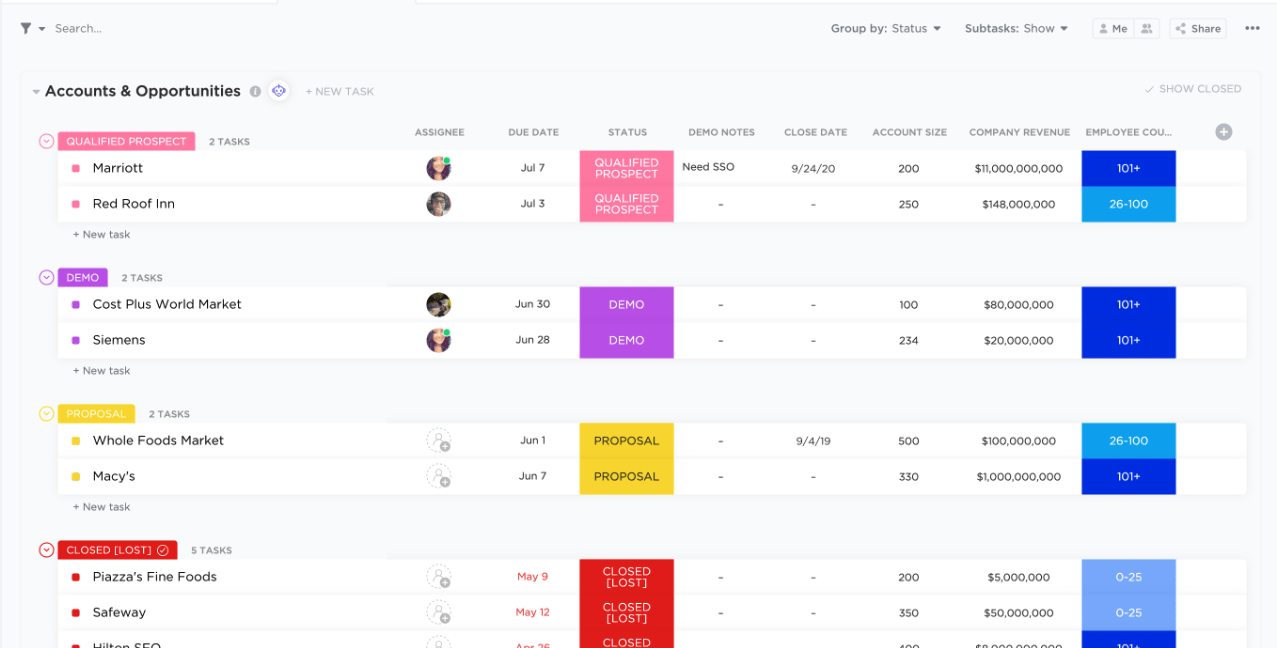
Sharing this data with your sales reps will let them see how their performance compares with other team members.
Once again, it’s important to not create a workplace that focuses only on competition.
C. Growth
Growth KPIs track how many sales opportunities or prospects have been converted into a new customer:
6. Average conversion rate
Average conversion rate tracks how long it takes for leads to convert to a customer.
The average conversion rate also tells you how productive your sales funnel is and if you’re on the right track to reach every sales goal. If your lead conversion rate is on target, then your sales pipeline is probably also on track.
You also need to find out how many leads are actually being converted into qualified opportunities (lead opportunity ratio). This lets you know if you’re targeting the right kind of leads.
Here’s how you can calculate your lead opportunity ratio:
Lead opportunity ratio = Number of leads that convert to opportunities / Total number of leads
Bonus: Check out our top 10 list of the best CRO Tools.
7. Monthly sales growth
Monthly sales growth is a metric that helps you track the difference in your sales revenue on a monthly basis.
By automating and monitoring your monthly sales growth, you can see sales revenue trends in real-time.
Every sales representative needs to set attainable monthly sales goals to ensure that your revenue growth is enough to maintain your profit margin.
D. Customers
Customer KPIs track the impact your customers have on your business. This includes how many customers your company has acquired and lost:
8. Customer lifetime value
Customer lifetime value is a KPI that determines how much revenue your company can expect from individual customer accounts. 💰
It basically tracks the value of your existing customer accounts.
For example, Scooby-Doo can’t go anywhere without his Scooby Snax.
So Scooby (and Shaggy) offer a high lifetime value for the Scooby Snax company.
Bonus: Sales enablement software!
9. Churn rate and customer retention
You know that feeling you get when your customers try out your product or service and then move on to a competitor’s product? 😞
To avoid the pain of betrayal, you need to keep every customer happy so they don’t say goodbye and churn out.
That’s what KPIs churn rate and customer retention rate focus on. They track lost customers and revenue over time.
10. Customer acquisition cost
Customer acquisition cost is a measurement of how much it actually costs your company to acquire a new customer.
This also includes marketing, advertising, salaries, and other hidden costs.
As a result, the customer acquisition cost is also an inbound marketing KPI that tracks how efficient your marketing efforts are.
For example, if your cold calling approach (outbound marketing) isn’t working, then perhaps your marketing team should commit to a social media campaign (inbound marketing).
Or, if your company finds that your inside sales techniques (calls, emails, etc.) aren’t as effective to acquire customers anymore, then looking at outside sales ventures (billboards) might be a solution.
Looking for some marketing KPIs? Here are 7+ marketing KPIs.
The Best Way To Track And Measure Sales KPIs
Sales KPIs are all about setting objectives, working towards those objectives, and then evaluating the efficiency of your team’s performance.
But how do you keep track of all these elements?
The answer lies in using powerful sales KPI software with the right features.
And what better way to do this than to use ClickUp?
It’s packed with tons of features and as we all know…
Let’s take a look at how ClickUp helps your sales team:
1. Setting Goals
If you want to set and track your sales goals with ease, you need a goal tracking tool.
ClickUp gives you the option to create Goals (your sales KPI) that can be split into smaller Targets.
Targets are your objectives, and once you hit all your targets, you hit your KPI 🎯
And every time you complete a Target, ClickUp shows you your progress towards your overall Goal.
You also get to customize the metrics you choose to track your KPIs, such as:
- Numbers: numerical figures such as the average purchase value
- Currency: for metrics like monthly sales revenue or customer acquisition cost
- True/False: Use a Done/Not Done checkbox to mark your Target complete
- Tasks: to track performance based on the number of sales tasks you’ve completed
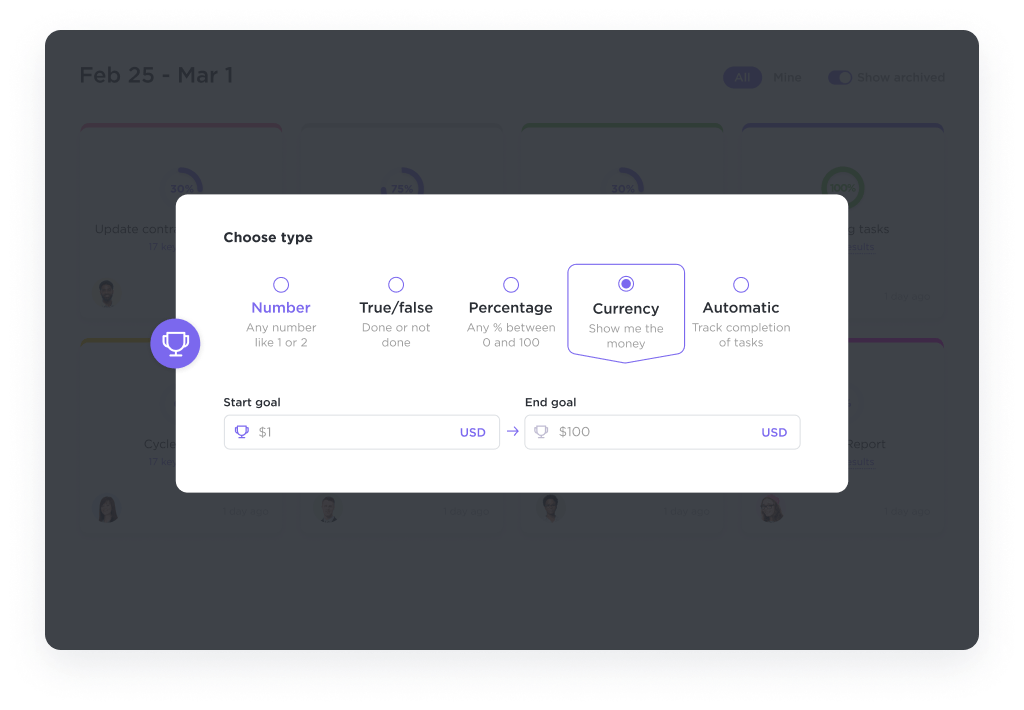
Check out the differences between KPIs and metrics.
And if you’re having trouble coming up with ideas for your sales goals, check out Mind Maps. They help your sales team brainstorm some great goal ideas that you wouldn’t have come up with on your own.
2. Managing your sales KPIs
To manage your sales KPIs successfully, you need a sales dashboard.
Without one, your teams and managers won’t have access to real-time data or know what the next best step is.
Why not try out Dashboards?
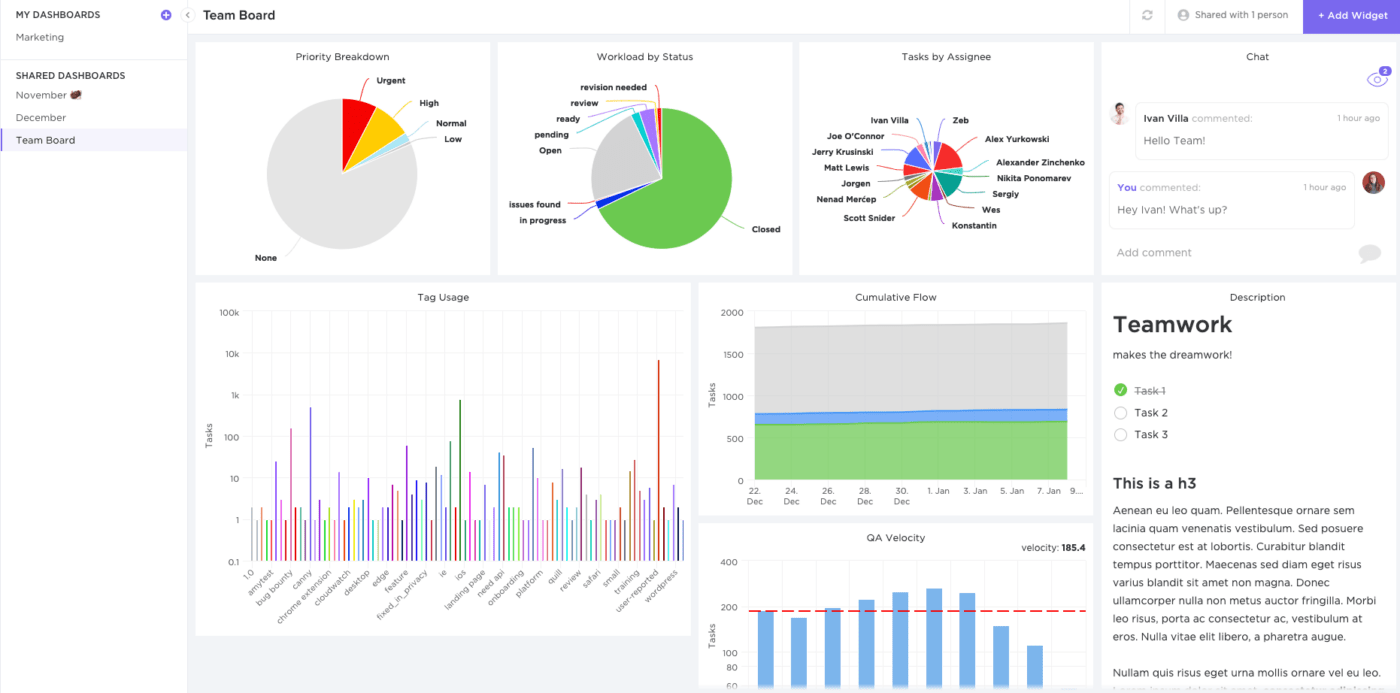
They’re the perfect place to view all your sales analytics.
Why?
Each Dashboard contains tons of Custom Widgets for high-level overviews of your sales KPIs.
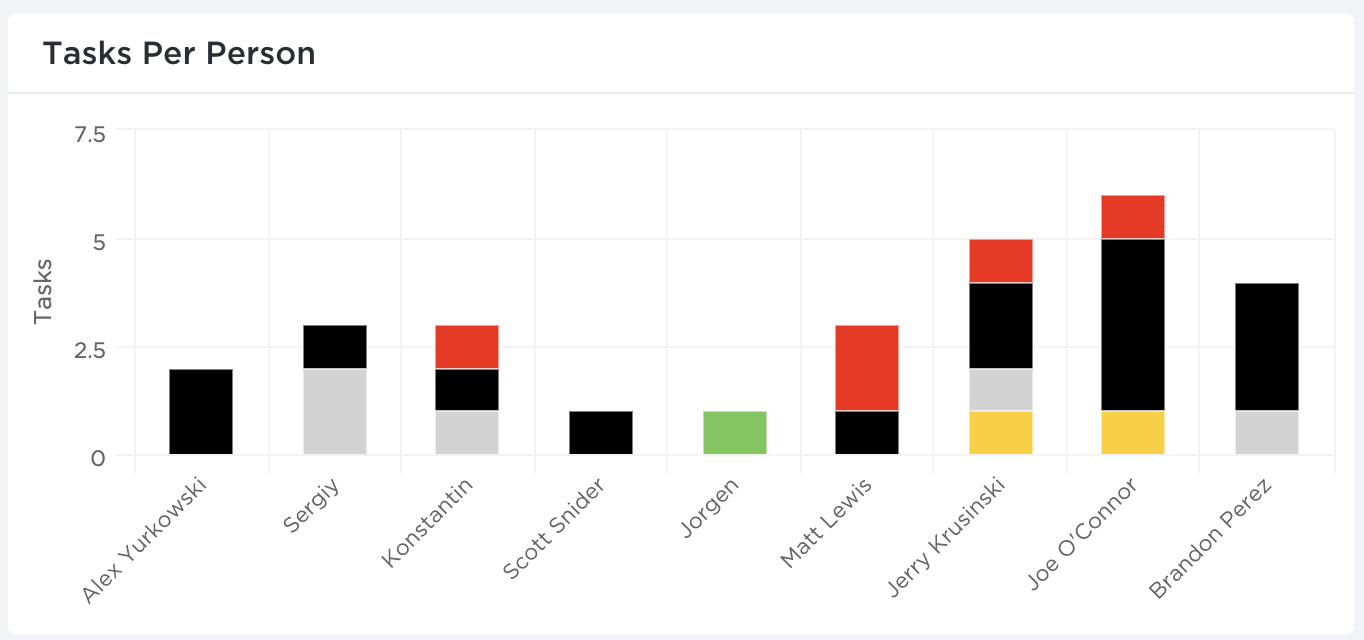
Here’s a list of some of the widgets you can add to your KPI dashboard:
- Line Chart
- Bar Chart
- Pie Chart
- Battery Chart
- Calculation (to calculate sums, averages, and other numerical data)
This way, you can keep track of every sales metric and KPI, the way you want to!
Check out these quote templates!
3. Checking your team’s performance
KPIs are all about tracking performance, right?
So, of course, you need to track your sales team’s performance!
But how do you do this?
Do you simply ask team members to inform you about their performance, or do you use powerful reporting software that will give you accurate insights into your team’s sales activity?
We vote option number two, considering employees aren’t always reliable when evaluating themselves:
You can track your sales team’s performance by adding Table Widgets to your Dashboards.
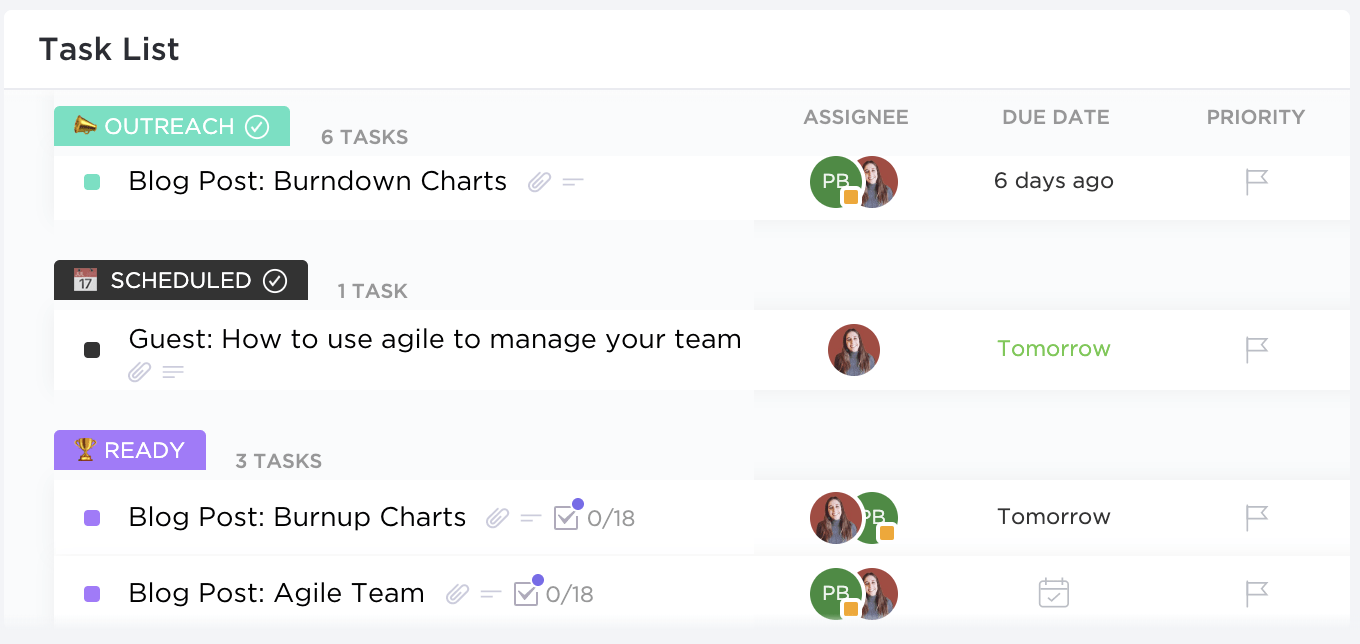
With these Widgets you’ll have everything you need to see how well your sales team is doing and where there’s room for improvement.
Here are some of the Widgets you’ll get:
- Completed Report: determines how many tasks each team member has completed
- Worked On: see the number of tasks each member worked on a specific day, week, or month
- Workspace Points: gamify your sales tasks so you can identify the top performers
- Who’s Behind: identify which sales reps or team members are behind by seeing the number of uncleared notifications and overdue tasks
Looking to learn more about sales reports? Check out our ultimate guide on KPI reports.
Time To Close Those Sales 📈
KPIs for sales help you manage your sales with ease.
They’re the core metrics that every company needs to track how their sales plan is going.
But simply choosing a KPI isn’t enough.
You need to track it too!
And to do this, you need a KPI tool like ClickUp.
ClickUp has everything you need for Goal management, and on top of that, the app also has the perfect KPI Dashboard for all your sales plans.
So why not get ClickUp for free today to skyrocket your sales to a different planet?


Questions? Comments? Visit our Help Center for support.